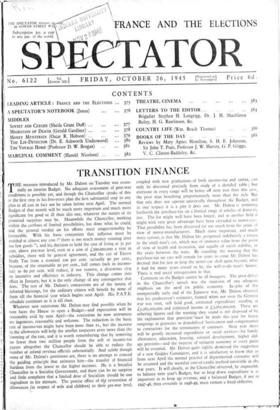TRANSITION FINANCE
THE measure introduced by Mr. Dalton on Tuesday was essen- tially an interim Budget. No adequate assessment of post-war conditions is possible yet, and though the Chancellor speaks of this
as the first step in his five-years plan the first substantial step in any plan at all can in fact not be taken before next April. The normal Budget of that month will be much more important and much more significant for good or ill than this one, whatever the nature of its promised surprises may be. Meanwhile the Chancellor, working within the confines of limited possibilities, has done what he could, and the general verdict on his efforts must unquestionably be favourable. With his basic contention that inflation must be avoided at almost any cost (" there is too much money running after too few goods"), and his decision to hold the cost of living at 31 per
cent, above pre-war level, even at a cost of L300,000,000 a year in subsidies, there will be general agreement, and the cut of Excess
Profit Tax from a nominal too per cent. (actually 90 per cent., because, of the returnable zo per cent., half comes back in income- tax) to 6o per cent, will reduce, if not remove, a disastrous clog on incentive and efficiency in industry. This change comes into effect in January, but it is the only change of any consequence that does. The rest of Mr. Dalton's concessions are of the nature of deferred blessings, for the ordinary citizen will benefit by none of them till the financial year which begins next April. His P.A.Y.E. schedule continues as it is till then.
Whatever new remissions Mr. Dalton may find possible when he next faces the House to open a Budget—and expectation will be reasonably avid by next April—the remissions he now announces are ingenious, reasonable and welcome. The reduction in the basic rate of income-tax might have been more than is., but the increase 41 the allowances will help the smaller taxpayers even more than the
lowering of the rate, and it is worth remembering that by removing no fewer than two million people from the roll of income-tax
payers altogether the Chancellor should be able to reduce the number of inland revenue officials substantially. And subtle though some of Mr. Dalton's provisions are, there is no attempt to conceal the guiding principle that animates him—the transfer of financial burdens from the lower to the higher incomes. He is a Socialist Chancellor in a Socialist Government, and there can be no surprise and little complaint that a limited dose of Socialism should be one ingredient in his mixture. The precise effect of the restoration of allowances (in respect of wife and children) to their pre-war level, coupled with new graduations of both income-tax and surtax, can only be discerned precisely from study of a detailed table ; but everyone in every range will be better off next year than this year, the poor man benefiting proportionately more than the rich. But that rule does not operate universally throughout the Budget, and in one respect it is a pity it does not. Mr. Dalton is remitting forthwith the purchase-tax on a limited range of articles of domestic use. The list might well have been longer, and in another field it might with very great advantage have been extended to motor-cars. That possibility has been discussed far too much from the point of view of motor-manufacturers. Much more important, and much more serious, is that Mr. Dalton has postponed indefinitely a return to the small man's car, which was of immense value from the point of view of health and recreation, and equally of social stability, in the years between the wars. By sounding the warning that the purchase-tax on cars will remain for .years to come Mr. Dalton has decreed that for just so long the motor-car shall again become, what it had for many years ceased to be, the well-to-do man's luxury. There is real social retrogression in that.
Comment on the Budget cannot be all bouquets. The great defect in the Chancellor's speech was the omission of any adequate emphasis on the need for public economy. In spite of the unexpectedly early end of the Japanese war, Mr. Dalton observed that his predecessor's estimates, framed when not even the German war was over, still hold good, estimated expenditure standing at £5,565,00o,000 and estimated income at L3,265,000,000. These are sobering figures and the warning they sound is not disposed of by the explanation that provision must be made this year for heavy outgoings in gratuities to demobilised Servicemen and compensation to contractors for the termination of contracts. Next year there will be greatly increased expenditure or social services—for family allowances, education, housing, colonial development, higher old- age pensions—and the exercise of stringent economy at every point will be essential. Mr. Dalton quite rightly dismissed the suggestion of a new Geddes Committee, and it is satisfactory to know that as from next April the normal practice of departmental estimates will be resumed and the wasteful vote-of-credit method inevitable in the war years. It will clearly, as the Chancellor observed, be Impossible to balance next year's Budget, but to keep down expenditure is as important as to keep up revenue, and a balanced Budget, if not in 1947-48, then certainly in 1948-49, must remain a fixed obrective.


























